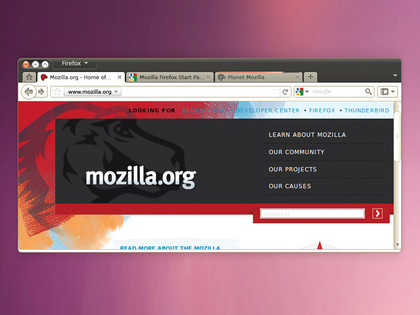Sign up for breaking news, reviews, opinion, top tech deals, and more.
You are now subscribed
Your newsletter sign-up was successful
The Firefox team has a lot to think about, and they don't have much time. Firefox 4 is due in November, and many of the plans for it were outlined in May in a web presentation by Mike Beltzner, Firefox's director. He asked, firstly, who uses the browser?
Apparently, there's a split between early adopters, mainstream users and developers, and the new version of the browser has to cater for them all equally. It was no surprise that the first word in the plan was 'fast'.
What was interesting was that there wasn't an all-out race for benchmark dominance; it was more to do with what the user sees. Beltzner gave an example of how a progress meter's design might affect how speed is perceived.

As a result, Firefox 4 will use a sleek theme. Early mock-ups look very like Chrome. Reading the details, there'll be no modal dialogues, updates will occur in the background, there'll be no startup interruptions and add-ons won't need a restart.
Security is also important. There's going to be a permissions manager that will show you your relationship with a site. So far, the manager shows a list of websites, with a list of permissions that correspond to a site's capabilities. You could choose to disable geolocation data, for example, or customise pop-up blocks.
But while privacy may be an issue for data you don't explicitly share, Firefox 4 is going to have a more social aspect, with features designed to help you share your favourite websites and even open tabs.
HTML 5
Sign up for breaking news, reviews, opinion, top tech deals, and more.
There's been a lot of work on the HTML 5 rendering layer, and multi-touch gestures sound exciting. There's also been progress on animation with CSS 3 transitions, along with a new remote JavaScript debugger, profile manager and WebGL – all part of Mozilla's new web standard to bring interactive 3D graphics to web pages, as tried by VRML.
As well as the rhetoric about the interface inferring speed, JavaScript is being overhauled. The new engine is called JaegerMonkey, and attempts to improve some of SpiderMonkey's clever trace routines with simpler, more efficient codes that compile entire subroutines without over-analysis. This is perfect for cases in which trace routines don't work because an application isn't repetitive enough.
At the end of May, David Mandelin, a Mozilla programmer responsible for JavaScript development, announced that JaegerMonkey was at the half-way point. Results indicate that it's doubled its efficiency, although benchmarks say it's still slower than Google's V8 and Apple's Nitro.
But speed isn't just about UI and JavaScript. Mozilla's asked the Reddit community for their multi-minute launch profiles to improve speed and, hopefully, image.
Competition
The real test is how Firefox is going to adapt to a market that's being dominated by embedded and locked-down devices that won't necessarily make things easy for people who want to use it.
Google's Chrome OS is a prime example. It's a complete operating system that's built around Chrome. There's a similar situation in the mobile market. Mozilla ruled itself out of the iPhone, stating that Apple made it too hard to create a competing browser, and Apple hasn't relented on its no browsers rule, other than to allow Opera.
Android's a different story, and is becoming the only real iPhone competitor. As a result, Mozilla's been trying to create a mobile version of its browser. It released an early-Alpha version for Android, Fennec, at the end of April, which had most of the desktop features, including add-on support. But it's clear that there's a lot of work to do.
Regardless of plans, most users want to know how Firefox is going to fare against Chrome. Mozilla is pragmatic. It wants to boost co-operation and play down conflict. Beltzner said, "We watch our competitors and our competitors watch us, and we are in it to win it."
Mozilla has the skill, financing and community to succeed. But it hasn't been in this position before; for years, Firefox has been the standard open source browser. But competition is good. If Mozilla really wants to win, that makes us all beneficiaries in a contest that may transform Linux.